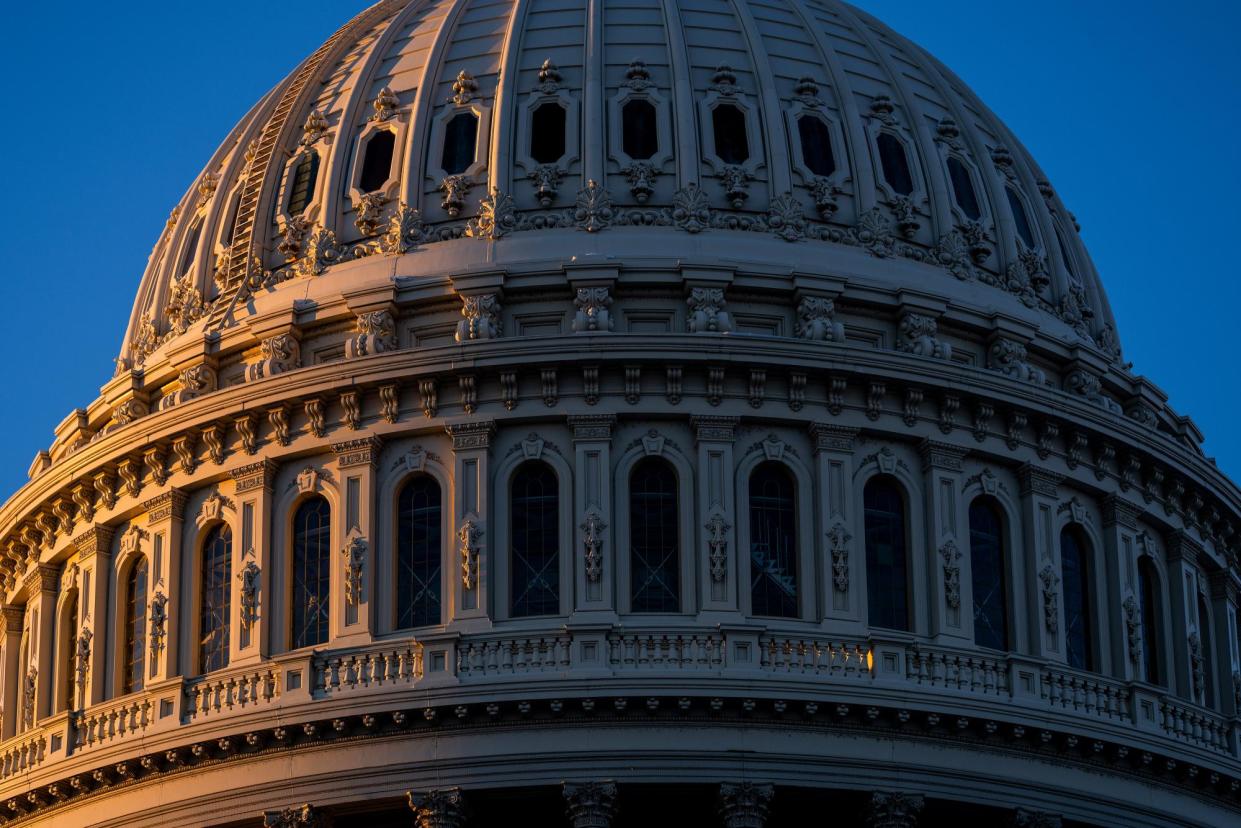Biden signs $1.2tn spending package as government shutdown is averted

President Joe Biden on Saturday signed into law a $1.2tn budget bill to keep the US government funded through a fiscal year that began six months ago and to avert a partial shutdown, according to a statement released by the White House.
“The bipartisan funding bill I just signed keeps the government open, invests in the American people, and strengthens our economy and national security,” Biden said in the statement.
The bill was passed in the Senate after midnight in a vote that fell 74-24. It came after funding had expired for government agencies, but the White House sent out a notice shortly after the deadline announcing the Office of Management and Budget had ceased shutdown preparations because there was a high degree of confidence that Congress would pass the legislation and the president would sign it on Saturday.
“Because obligations of federal funds are incurred and tracked on a daily basis, agencies will not shut down and may continue their normal operations,” the White House statement said.
Related: US House passes $1.2tn spending bill hours before shutdown deadline
Prospects for a short-term government shutdown had appeared to grow Friday evening after Republicans and Democrats battled over proposed amendments to the bill. Any successful amendments to the bill would have sent the legislation back to the House, which had already left town for a two-week recess.
But shortly before midnight Senate majority leader Chuck Schumer announced a breakthrough.
“It’s been a very long and difficult day, but we have just reached an agreement to complete the job of funding the government,” Schumer said. “It is good for the country that we have reached this bipartisan deal. It wasn’t easy, but tonight our persistence has been worth it.”
The news came hours after the House voted 286 to 134 to pass the bill, which will fund the departments of state, defense, homeland security and others through September.
US congresswoman Alexandria Ocasio-Cortez was one of 22 House Democrats who voted against the $1.2tn, six-month spending package. The package includes a ban on direct US funding for the United Nations Relief and Works Agency for Palestinian refugees, an agency providing key assistance to Gaza, until March 2025.
Biden has already said he will sign the bill “immediately” once it reaches his desk. The president signed a spending bill covering the rest of the federal government earlier this month, so all agencies are now funded for the rest of the fiscal year, eliminating any threat of a shutdown until October.
The bill’s approval brings an end to a tumultuous appropriations process that forced Congress to pass four stopgap funding bills, known as continuing resolutions, since the fiscal year began in October. Senator Patty Murray of Washington, the Democratic chair of the Senate appropriations committee, praised the lawmakers who helped bring the process to a close but lamented the considerable delay in reaching a resolution.
“It should never have taken us this long to get here,” Murray said in a floor speech on Friday. “We should not teeter on the verge of a shutdown and lurch from one CR to another.”
The Senate vote came down to the wire. Members had to unanimously agree on fast-tracking the bill’s passage, and some Republicans raised objections to the expedited process, insisting on taking up amendments to the proposal.
Senator Rand Paul, a Republican of Kentucky, attacked congressional leaders for releasing the lengthy bill in the early hours of Thursday morning and holding a final vote one day later.
“Why are we up against a deadline? Because they didn’t give us the 1,000-page bill until 2.30 in the morning on Thursday,” Paul said in a floor speech. “You think we ought to read it? You think we ought to know what’s in it?”
Paul warned the bill was “teeming with about $2bn worth of earmarks at a time when we can’t afford the additional debt”, calling on colleagues to block the proposal.
Rejecting that line of criticism, the senator Susan Collins of Maine, the top Republican on the Senate appropriations committee, reminded colleagues that members of both chambers spent months negotiating over funding levels.
“Every single bill – each and every one of them – was subject to robust debate and amendments. Many of them passed unanimously,” Collins said. “No one can say that they were not available for scrutiny, since we reported the last of them from committee way back in July.”
Murray blamed hard-right Republicans for repeatedly jeopardizing the federal government’s functionality and urged her colleagues to “learn from the hard lessons of the past few months about how we do get things done in a divided government”.
“The far-right elements who forced this dysfunction claim to care a lot about fiscal responsibility, but the constant chaos that they create is the opposite of fiscal responsibility,” Murray said. “Working together, focusing on solutions, solving problems for people back home: that is the responsible way to get things done.”
With Associated Press